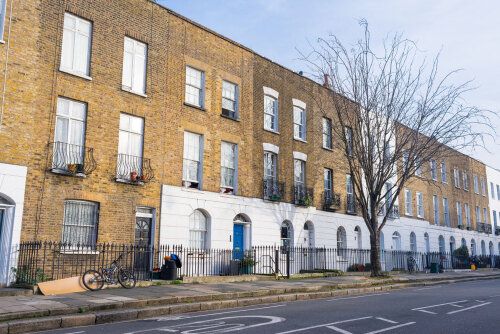Service charges and ground rent: a guide for landlords
Service charges and ground rents are not normally at the forefront of a prospective buyer's mind when they are looking into a new property investment. However, many discover later in the purchasing process that the nature of their ownership arrangement as a leaseholder means they are liable for regular fees averaging a couple of thousand pounds a year.
The are two main forms of property ownership in the UK: freehold and leasehold. It is important to understand the distinction before investing in a property, as there are different rights, responsibilities, and financial implications depending on the type of ownership you purchase.
Freeholders have legal ownership of the building and land it stands on, while leaseholders usually own a flat within the building itself. Each party has its own set of responsibilities; for example, leaseholders are expected to pay service charges and ground rent to their property’s freeholder. In return, freeholders provide maintenance services across the building's communal areas and occasionally offer additional amenities (such as a concierge desk).
While leaseholders are to a certain extent autonomous property owners, with mortgages and most standard ownership rights, they are still required to make regular payments to their freeholders concerning maintenance and cover ground rent fees. In this sense, leaseholders are in fact the freeholder’s ‘tenants’, though the relationship is quite different to that between a landlord and tenant under an AST.
To learn more about how service charges and ground rents and how they work, read our guide below.
What are service charges?
Service charges are property maintenance payments made by the leaseholder to the landlord. They are used for repairs, general upkeep, and building insurance. Service charges cover day-to-day expenses (such as cleaning of communal areas) as well as contributing to funding reserves for major structural repairs. These charges can also cover cyclical expenses, such as routine interior redecoration or pipework maintenance.
Your lease will specify everything that your service charge covers. Freeholders are legally required to show leaseholders a summary of what the service charge is used for, with corresponding receipts. Service charges can be paid annually, biannually, or in monthly instalments. Your payment schedule will be established in your lease agreement.
What is ground rent?
Ground rent is a payment made by the leaseholder to the freeholder of the property. Leaseholders own the property inside the building, as in, their living space and its fixtures. However, leaseholders do not own the building nor the land in which their property is located in and on. Ground rent acts as a “leasing fee” for the land that leaseholders reside on.
While ground rent is usually paid annually, the specific conditions are stated in the lease agreement. Other common plans include bi-annual or quarterly payments. Only if the landlord has provided the leaseholder with a formal, written document demanding ground rent does the payment have to be made. If ground rent is requested and not paid, landlords can take legal action against the leaseholder and recover up to 6 years of ground rent back payments.
What is the difference between a freeholder and a leaseholder?
Freeholders own both the building and the land on which the building stands. Leaseholders are owners of a property for a particular period of time. Leaseholders lease the property from the freeholder. Typically, leaseholds are used in flats and maisonettes; for the most part, standalone houses are sold freehold. Leaseholders have ownerships over the property but do not have a stake in the actual building the property resides in. Leaseholds are set for long lengths of time, usually ranging from 90 to 120 years. However, leaseholds can also range from as little as 40 years to as high as 999 years.
Freeholders do not pay ground rent, as they own the land. However, freeholders are responsible for the general maintenance the building and making sure the external structural components are in good condition (i.e. the building's roof and walls). On the other hand, leaseholders pay ground rent and service charges to the freeholder. In the lease agreement, the specific assigned responsibilities of the freeholder and leaseholder are stated. In some cases, leaseholders can claim the Right to Manage from freeholders, transferring certain upkeep responsibilities to them.
Why do freeholders sometimes pay service charges?
The maintenance and upkeep of communal areas around freehold houses in England is carried out by the property’s local council. This includes road, pavement, and street lighting repair. Nevertheless, some freehold properties will need to pay service charges if they are built on private land or are part of a greater private development. During the planning process, the property’s developers decide, alongside the local council, which areas surrounding the property are to be privately managed.
How much is the service charge on average?
Service charges are determined based on estimated property running costs. Typically service charges are around £1,000 to £2,000 per year. Newer buildings, with additional facilities, such as indoor gyms, will most likely require higher service charges.
How much is ground rent on average?
In the past, ground rent was used as a symbolic payment for land usage. The fees were so small they were known as peppercorn rent, costing about £10 a year. Now, ground rent averages around £400 annually, with costs rising for newer properties.
What are my rights as a leaseholder?
Leaseholders are entitled to the freeholder’s information (name and address) and information concerning service charges or insurance. Leaseholders can also challenge charges under specific circumstances and be consulted about building maintenance. Under the Leasehold Reform Act of 1967, house leaseholders are able to extend the lease or buy the freehold of their house. Flat leaseholders are able to extend their lease or buy the freehold of the flat under certain conditions.
The Leasehold Reform (Ground Rent) Bill aims to provide greater transparency in new, qualifying long-term residential leasehold properties in England and Wales. Under the bill, ground rent demanded for a new residential lease cannot exceed one peppercorn per year.
The reduction of ground fees to a nominal fee of virtually nothing will make future leaseholder ownership more affordable. Freeholders will also be prohibited from charging administrative fees for collecting the peppercorn rent. Freeholders who violate the Bill will receive hefty financial penalties, up to £30,000.
As of October 2021, the Bill is still making its round throughout Parliament.
If I let my leasehold property, can I ask my tenants to pay the service charges and ground rent?
The Tenant Fee Act prohibits landlords from charging any fees to tenants other than those specifically permitted under the act (e.g. the rent, a refundable tenancy deposit, costs incurred by changing the tenancy agreement or terminating it early). This means that you cannot make it a condition of the tenancy agreement that your tenants accept responsibility for your charges as the leaseholder.
The fees owed to the freeholder must be covered by the rental income you make from the tenancy or paid out of pocket. If you have higher service charges because the freeholder provides several amenities for residents throughout the wider building, then your property should generally command a higher value on the market commensurate with these extra perks.
Understanding the differences between freehold and leasehold properties is key in recognizing what responsibilities will be required of you as a property owner. Service charges are a universally required payment for leaseholders, but under the new Leasehold Reform Bill, ground rent payments are soon expected to cease for new residential leases. Remember to continue requesting service charge cost breakdowns from your freeholder, to track how your regular payments are being used for the general upkeep of the property.
At Home Made, we offer a hybrid lettings solution that adds value at every stage of the rental process. With our game-changing new landlord platform, The Property Wallet, we offer London landlords exceptional tenant-find and property management services for a low monthly fee.
- Avoid expensive upfront fees and spread the cost of marketing your property with the option to pay monthly.
- Free rent collection and arrears chasing.
- Sign off and see all charges and payments in your dashboard.
- Real-time updates on marketing, viewings, and offers.
Prices start from just £50+VAT/mo for tenant-find and £60+VAT/mo for management. Alternatively, you can pay a one-off upfront fee of £1,200+VAT for our tenant-find service.
If you would like to speak with us about your property needs, contact us via our website to find out how we can help. If you're ready to get started, book your free valuation here.
Book valuationCheck out more of our landlord advice here and follow us on Twitter, Linkedin, and Instagram for regular updates on industry compliance standards, market insights, and Home Made company news.
Check out more of our landlord advice here and follow us on Twitter, Linkedin, and Instagram for regular updates on industry compliance standards, market insights, and Home Made company news.




